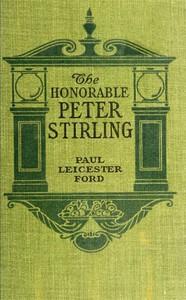|
|
Read this ebook for free! No credit card needed, absolutely nothing to pay.Words: 150166 in 97 pages
This is an ebook sharing website. You can read the uploaded ebooks for free here. No credit cards needed, nothing to pay. If you want to own a digital copy of the ebook, or want to read offline with your favorite ebook-reader, then you can choose to buy and download the ebook.

: The Honorable Peter Stirling and What People Thought of Him by Ford Paul Leicester - New York (N.Y.) Fiction; Love stories; Political fiction; Tenement houses Fiction; Labor movement Fiction Bestsellers American 1895-1923@FreeBooksTue 06 Jun, 2023 THOSE DEAR TO ME AT STONEY WOLDE, TURNERS, NEW YORK; PINEHURST; NORWICH, CONNECTICUT; BROOK FARM, PROCTORSVILLE, VERMONT; AND DUNESIDE, EASTHAMPTON, NEW YORK, THIS BOOK, WRITTEN WHILE AMONG THEM, IS DEDICATED. Mr. Pierce was talking. Mr. Pierce was generally talking. From the day that his proud mamma had given him a sweetmeat for a very inarticulate "goo" which she translated into "papa," Mr. Pierce had found speech profitable. He had been able to talk his nurse into granting him every indulgence. He had talked his way through school and college. He had talked his wife into marrying him. He had talked himself to the head of a large financial institution. He had talked his admission into society. Conversationally, Mr. Pierce was a success. He could discuss Schopenhauer or cotillion favors; St. Paul, the apostle, or St. Paul, the railroad. He had cultivated the art as painstakingly as a professional musician. He had countless anecdotes, which he introduced to his auditors by a "that reminds me of." He had endless quotations, with the quotation marks omitted. Finally he had an idea on every subject, and generally a theory as well. Carlyle speaks somewhere of an "inarticulate genius." He was not alluding to Mr. Pierce. At the present moment Mr. Pierce was having things very much his own way. Seated in the standing-room of a small yacht, were some eight people. With a leaden sky overhead, and a leaden sea about it, the boat gently rose and fell with the ground swell. Three miles away could be seen the flash-light marking the entrance to the harbor. But though slowly gathering clouds told that wind was coming, the yacht now lay becalmed, drifting with the ebb tide. The pleasure-seekers had been together all day, and were decidedly talked out. For the last hour they had been singing songs--always omitting Mr. Pierce, who never so trifled with his vocal organs. During this time he had been restless. At one point he had attempted to deliver his opinion on the relation of verse to music, but an unfeeling member of the party had struck up "John Brown's Body," and his lecture had ended, in the usual serial style, at the most interesting point, without even the promise of a "continuation in our next." Finally, however, the singers had sung themselves hoarse in the damp night air, the last "Spanish Cavalier" had been safely restored to his inevitable true-love, and the sound of voices and banjo floated away over the water. Mr. Pierce's moment had come. Some one, and it is unnecessary to mention the sex, had given a sigh, and regretted that nineteenth century life was so prosaic and unromantic. Clearing his throat, quite as much to pre-empt the pause as to articulate the better, Mr. Pierce spoke: "But, dear, one cannot imagine some people ever finding anything romantic in life," said a voice, which, had it been translated into words would have said, "I know you are right, of course, and you will convince me at once, but in my present state of unenlightenment it seems to me that--" the voice, already low, became lower. "Now"--a moment's hesitation--"there is--Peter Stirling." "Exactly," said Mr. Pierce. "That is a very case in point, and proves just what I've been saying. Peter is like the novelists of whom I've been talking. I don't suppose we ought to blame him for it. What can you expect of a son of a mill-foreman, who lives the first sixteen years of his life in a mill-village? If his hereditary tendencies gave him a chance, such an experience would end it. If one lives in the country, one may get fine thoughts by contact with Nature. In great cities one is developed and stimulated by art, music, literature, and contact with clever people. But a mill-village is one vast expanse of mediocrity and prosaicness, and it would take a bigger nature than Peter's to recognize the beautiful in such a life. In truth, he is as limited, as exact, and as unimaginative as the machines of his own village. Peter has no romance in him; hence he will never find it, nor increase it in this world. This very case only proves my point; that to meet romance one must have it. Boccaccio said he did not write novels, but lived them. Try to imagine Peter living a romance! He could be concerned in a dozen and never dream it. They would not interest him even if he did notice them. And I'll prove it to you." Mr. Pierce raised his voice. "We are discussing romance, Peter. Won't you stop that unsocial tramp of yours long enough to give us your opinion on the subject?" A moment's silence followed, and then a singularly clear voice, coming from the forward part of the yacht, replied: "I never read them, Mr. Pierce." Mr. Pierce laughed quietly. "See," he said, "that fellow never dreams of there being romance outside of novels. He is so prosaic that he is unconscious of anything bigger than his own little sphere of life. Peter may obtain what he wants in this world, for his desires will be of the kind to be won by work and money. But he will never be controlled by a great idea, nor be the hero of a true romance." Steele once wrote that the only difference between the Catholic Church and the Church of England was, that the former was infallible and the latter never wrong. Mr. Pierce would hardly have claimed for himself either of these qualities. He was too accustomed in his business to writing, "E. and O.E." above his initials, to put much faith in human dicta. But in the present instance he felt sure of what he said, and the little group clearly agreed. If they were right, this story is like that recounted in Mother Goose, which was ended before it was begun. But Mr. Pierce had said that romance is everywhere to those who have the spirit of it in them. Perhaps in this case the spirit was lacking in his judges--not in Peter Stirling. The unconscious illustration of Mr. Pierce's theory was pacing backwards and forwards on the narrow space between the cuddy-roof and the gunwale, which custom dignifies with the name of deck. Six strides forward and turn. Six strides aft and turn. That was the extent of the beat. Yet had Peter been on sentry duty, he could not have continued it more regularly or persistently. If he were walking off his supper, as most of those seated aft would have suggested, the performance was not particularly interesting. The limit and rapidity of the walk resembled the tramp of a confined animal, exercising its last meal. But when one stands in front of the lion's cage, and sees that restless and tireless stride, one cannot but wonder how much of it is due to the last shin-bone, and how much to the wild and powerful nature under the tawny skin. The question occurs because the nature and antecedents of the lion are known. For this same reason the yachters were a unit in agreeing that Stirling's unceasing walk was merely a digestive promenade. The problem was whether they were right? Or whether, to apply Mr. Pierce's formula, they merely imposed their own frame of mind in place of Stirling's, and decided, since their sole reason for walking at the moment would be entirely hygienic, that he too must be striding from the same cause? Dr. Holmes tells us that when James and Thomas converse there are really six talkers. First, James as James thinks he is, and Thomas as Thomas thinks he is. Second James as Thomas thinks him, and Thomas as James thinks him. Finally, there are James and Thomas as they really are. Since this is neither an autobiography nor an inspired story, the world's view of Peter Stirling must be adopted without regard to its accuracy. And because this view was the sum of his past and personal, these elements must be computed before we can know on what the world based its conclusions concerning him. Free books android app tbrJar TBR JAR Read Free books online gutenberg More posts by @FreeBooks
: The Singing Man: A Book of Songs and Shadows by Peabody Josephine Preston - Poetry@FreeBooksTue 06 Jun, 2023

: Lippincott's Magazine August 1885 by Various - Science Periodicals; Literature Modern 19th century Periodicals Contemporary Reviews; Lippincott's Magazine@FreeBooksTue 06 Jun, 2023
|
Terms of Use Stock Market News! © gutenberg.org.in2025 All Rights reserved.






